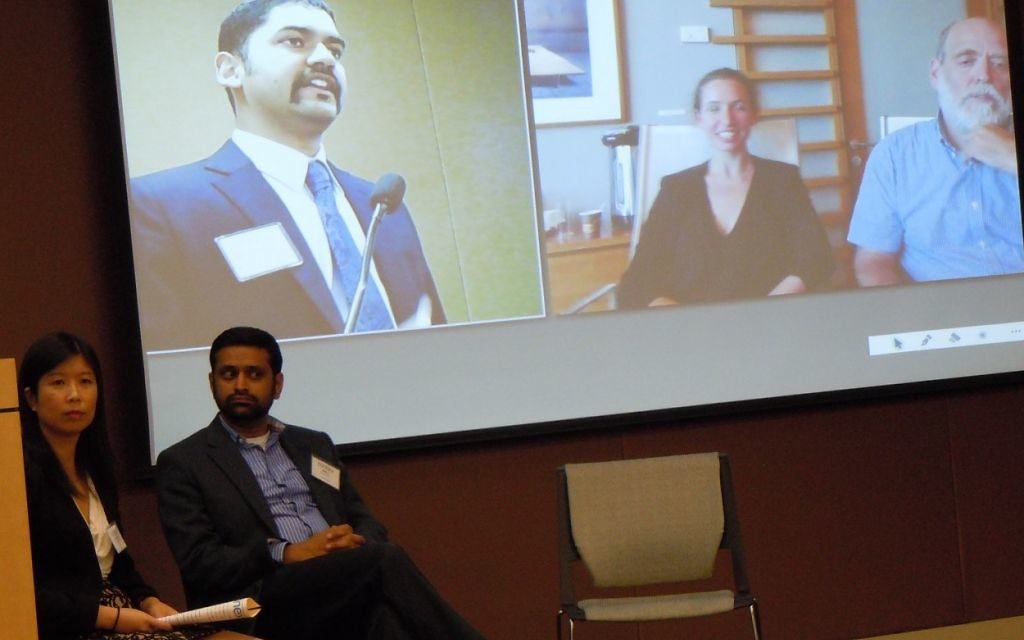Israel Helps Drive Retail Innovation
High-tech innovation in Israel extends to the retail world, as demonstrated July 22 at a discussion organized by Conexx: America Israel Business Connector.
Representatives of three Israeli companies — Screemo, EZFace and Spreo — teleconferenced into a gathering of about 60 people at IBM’s Sandy Springs offices to demonstrate their high-tech innovations in the retail space.
Tel Aviv-based Screemo, which dates to 2012, creates mobile experiences for retailers to engage with customers when they’re on the move. The key for Screemo is to make those interactions fun through customized games that run on mobile phones and keep the retailer in the potential customer’s mind. The games create calls to action that drive up sales and produce a buzz in social media. Screemo also eases retailers’ use of technology by auto-generating code and by operating through the cloud from any device.
Get The AJT Newsletter by email and never miss our top stories Free Sign Up
EZFace, led by serial entrepreneur and telecommunications expert Rami Orpaz, enhances the makeup shopping experience with a free mobile app called TryItOn. The app addresses the biggest problem in the $6.5 billion makeup market, Orpaz said: Women buy a product, try it once, then realize it’s not right for them and never use it again. TryItOn photographs and analyzes a consumer’s face with extreme precision, then shows exactly what a particular makeup will look like on that face after the woman scans a product code while shopping. The app includes social sharing so friends can see and comment on how the blush, lipstick or eyeliner will look.

Spreo, which was founded by Israelis Avi Sacajiu and Lior Meller and maintains research and development in Haifa while being based in New York, takes Global Positioning System-style navigation where GPS can’t go: indoors in major complexes such as shopping malls, warehouses and hospitals. Using Bluetooth beacons, WiFi signal fingerprinting and a proprietary indoor location algorithm, Spreo can help shoppers plan and carry out trips to the mall or retailers quickly locate items scattered through warehouses to fulfill orders.
Jacada, which has operated in Atlanta for 25 years and has offices in Herzliya, also presented its retail innovations to the crowd at IBM. The company provides customer experiences to close the gap between digital and physical retail channels. Addressing the problem of online consumers abandoning their virtual shopping carts, the retail interface integrates customer-facing employees to answer questions and help close sales.
Those companies are examples of a trend in retail, according to Shannon Wu-Lebron, a portfolio leader for IBM’s global retail business. She said retailers were traditionally too risk-averse to tread on the cutting edge, but the success of online-only retailers such as Amazon has forced brick-and-mortar retailers to increase their investment in research and development and innovate.
While some in the audience questioned how real retailers can survive in an increasingly virtual world, Wu-Lebron said the millennial generation’s interest in being local, green and socially responsible is expected to lead to a resurgence in people buying local instead of shopping online in the next five years.
Nitin Bhaskaran, who manages the customer experience at the online checkout for the Home Depot, said the trend is toward the integrated, omnichannel retail world supported by Jacada.
Bhaskaran said the retail process is circular for Home Depot customers, who can enter and exit at any point. They might conduct the entire process online or in a store. Or they might purchase online but pick up an item at a store or browse online but make the purchase decision at a store. Or shopping in person could lead to a networked terminal in a store and an online purchase that is picked up at the store.
“We were able to be relevant to our customers’ changing preferences,” he said.





comments